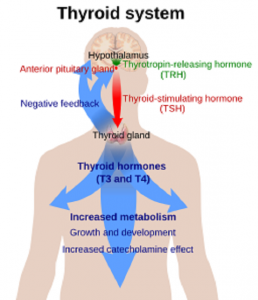Graves’ disease is an autoimmune disease. It is the most common cause of hyperthyroidism, i.e., overactive thyroid disorder. Ultimately, it is the overproduction of thyrotropin receptor (TRAb) antibodies that results in hyperthyroidism. Over time, Graves’ disease causes extensive damage to thyroid gland cells and tissues [Song 2023].

Oxidative stress appears to play an important role in Graves’ hyperthyroidism. Oxidative stress is the medical term for a disruption of the balance between harmful free radical oxidants and protective antioxidants. The increased production of reactive oxygen
radicals and inflammatory cytokines drives the development and progression of Graves’ disease [Song 2023].
Adequate intakes of dietary and supplemental selenium and the resultant adequate bio-synthesis of selenoproteins with antioxidant properties can be an important part of the therapy for hyperthyroidism. In a 2023 review, Song et al evaluated the clinical efficacy of combining selenium supplements with anti-thyroid drugs. They conducted a review and meta-analysis of seven randomized controlled trials enrolling a total of 209 Grave’s disease patients [Song 2023].
Beneficial Outcomes of Selenium Supplementation
The meta-analysis results showed the following beneficial outcomes in the selenium supplementation group relative to the control group. The outcomes are important to the treatment of hyperthyroidism:
- The selenium supplementation significantly increased the serum selenium levels.
Note: Increased selenium intake and status are important to the thyroid gland’s antioxidant mechanism that protects thyroid gland cells against harmful free radicals. In particular, the glutathione peroxidase and thioredoxin reductase seleno-enzymes are involved in the protection of the thyroid gland against oxidative stress.
- The selenium supplementation significantly lowered the free T3 and free T4 hormone levels.
Note: Typically, anti-thyroid medicine is used to try to prevent the thyroid gland from making too many thyroid hormones. Combining selenium supplementation, where indicated, with the anti-thyroid medication may be more effective than anti-thyroid medicine alone.
- The selenium supplementation significantly reduced the TPOAb and TRAb antibody levels.
Note: Elevated levels of these thyroid antibodies indicate that the immune system has made a mistake. The immune system has released antibodies that are mistakenly attacking thyroid gland cells and tissues. In effect, these antibodies act as auto-antigens. They trigger increased inflammation, cause damage to cells and tissues, and, eventually, result in the disruption of thyroid function. They cause the autoimmune thyroid disorders: Graves’ disease and Hashimoto’s thyroiditis.
Selenium Supplementation and Thyroid Disorders
Song et al report that research shows elevated levels of the TPOAb antibodies in 90% of Hashimoto’s thyroiditis (hypothyroidism) cases
and in 70% of Graves’ disease (hyperthyroidism) cases. They regard
increases in TPOAb antibody levels as an indicator of the severity and prognosis of hyperthyroidism.
- Abnormally elevated serum levels of TPOAb and TRAb antibodies are associated with the development of chronic prolonged autoimmune inflammation.
- TPOAb and TRAb antibodies are potent auto-antigens. They can cause autoimmune thyroid diseases and can damage thyroid cells directly.
Conclusion: Selenium Crucial for Healthy Thyroid Function
The combination of selenium supplementation with anti-thyroid medications can improve thyroid function in patients diagnosed with Graves’ disease.
Adding selenium supplementation to the conventional medication regime of hyperthyroid patients can lower the levels of the antibodies TPOAb and TRAb as well as the levels of FT3 and FT4 hormones.
The supplemental selenium may also have a beneficial antioxidant effect in the thyroid gland.
Sources
Song Q, Ji X, & Xie Y. Effects of antioxidant supplementation on Graves’ Disease: a meta-analysis. Journal of Clinical Pharmacy and Therapeutics. 2023;Article ID 5587361.
The information presented in this review article is not intended as medical advice. It should not be used as such.
